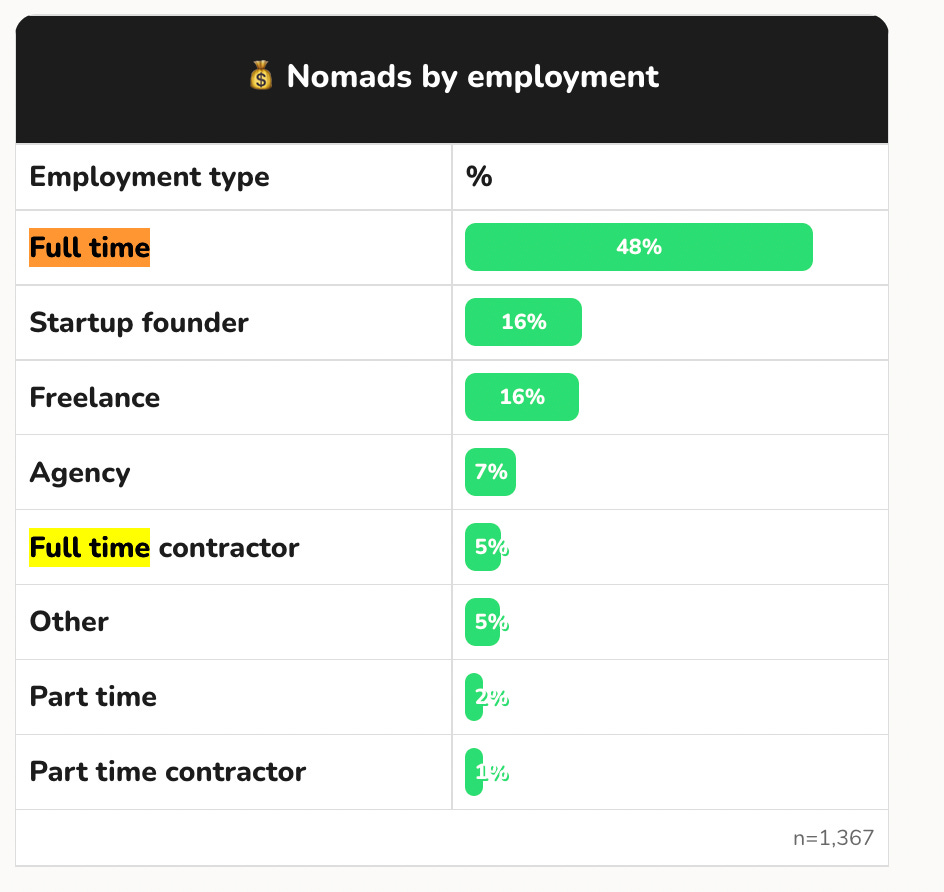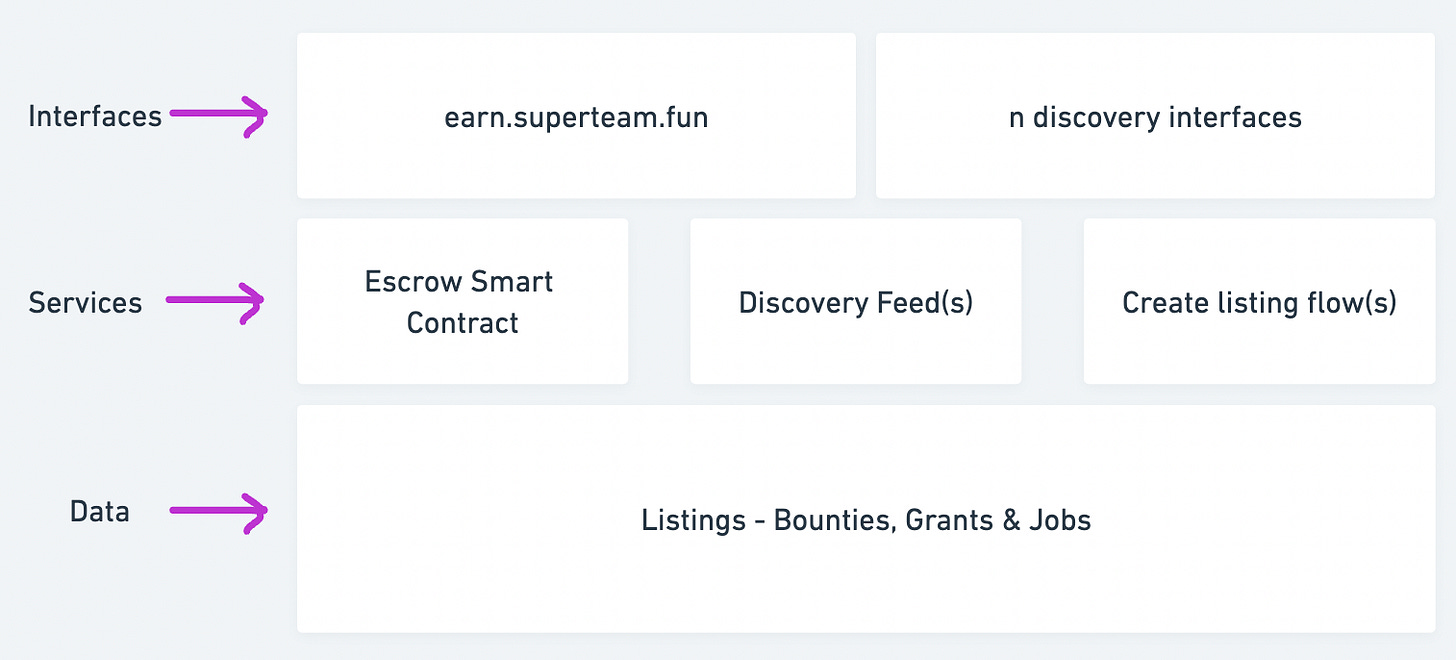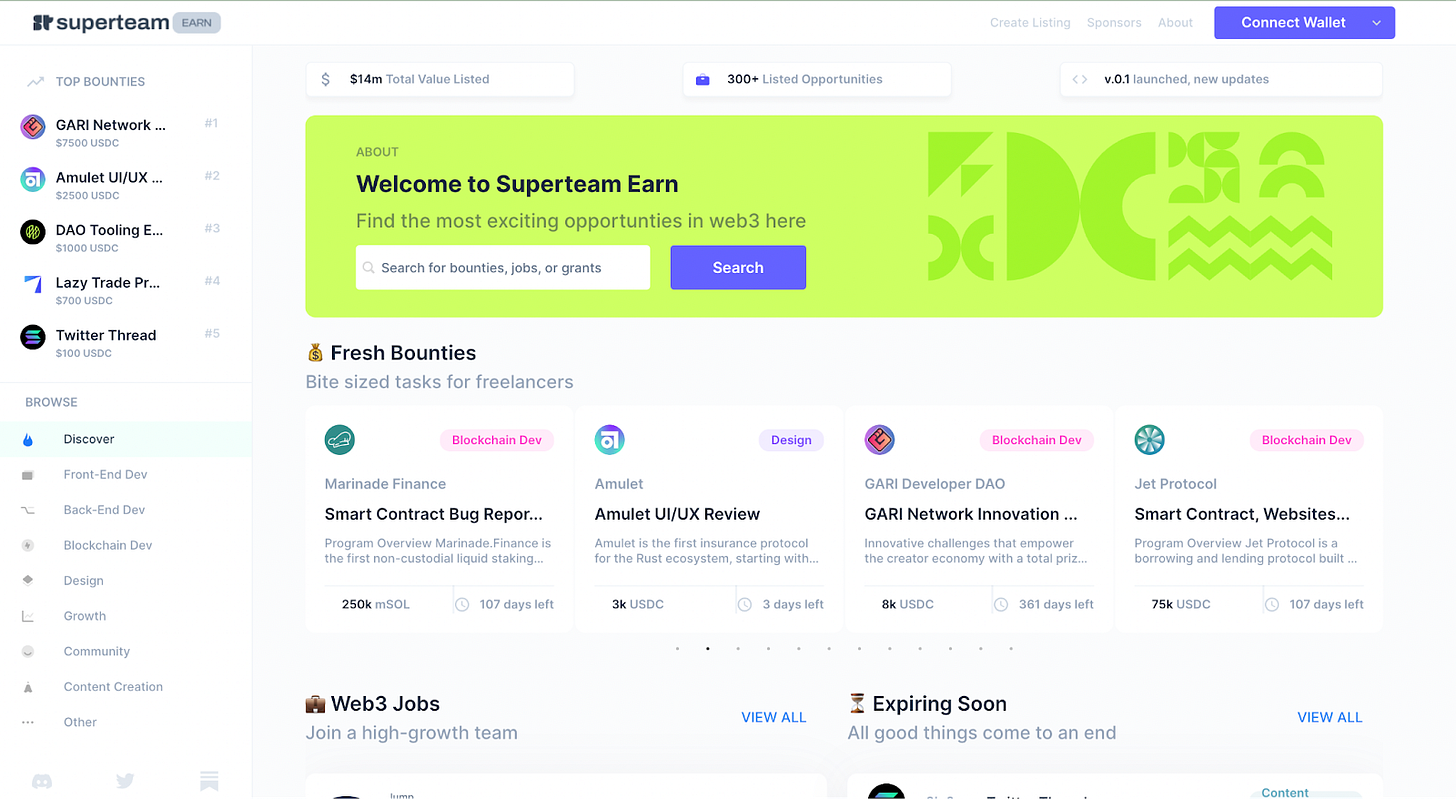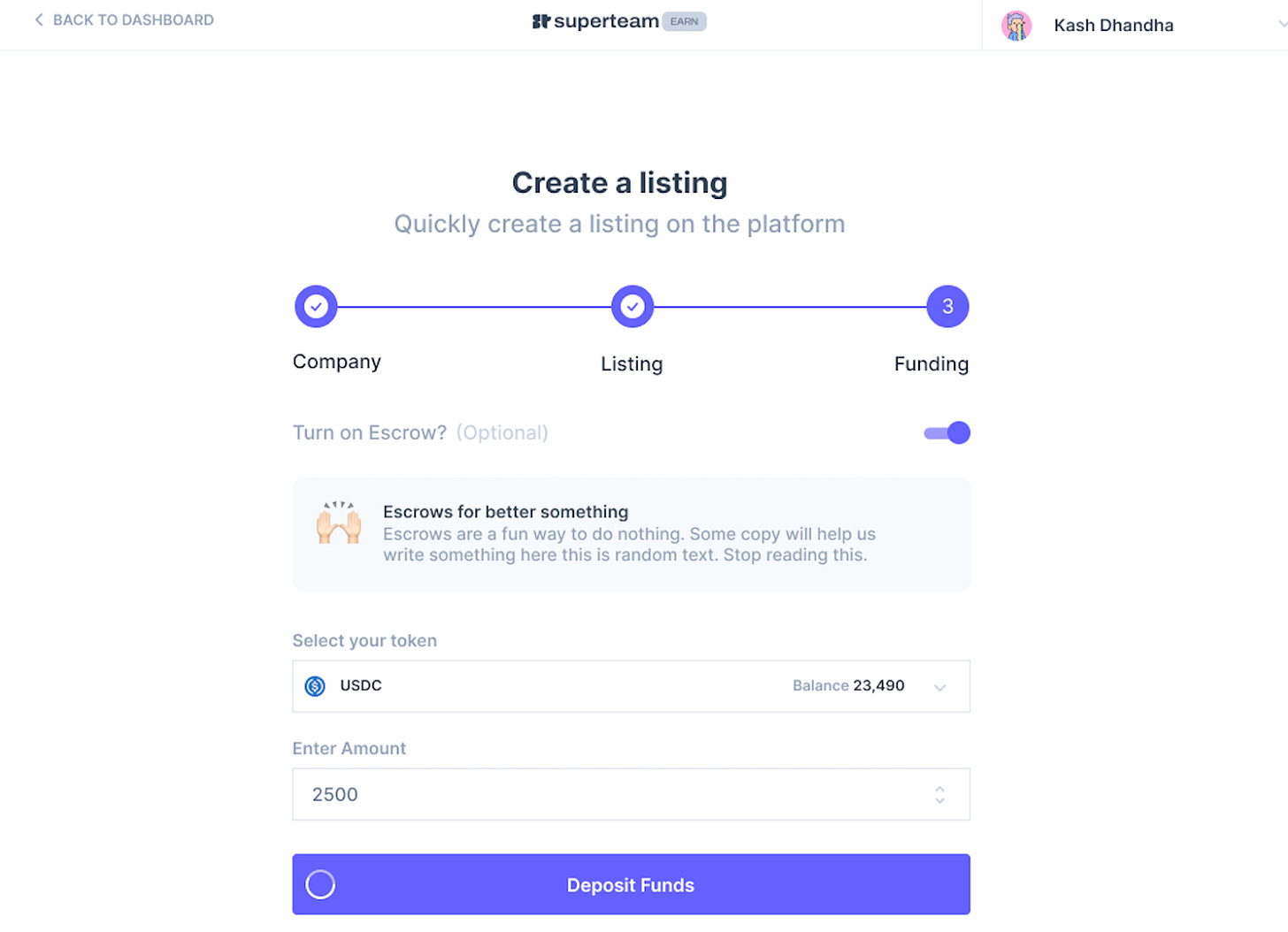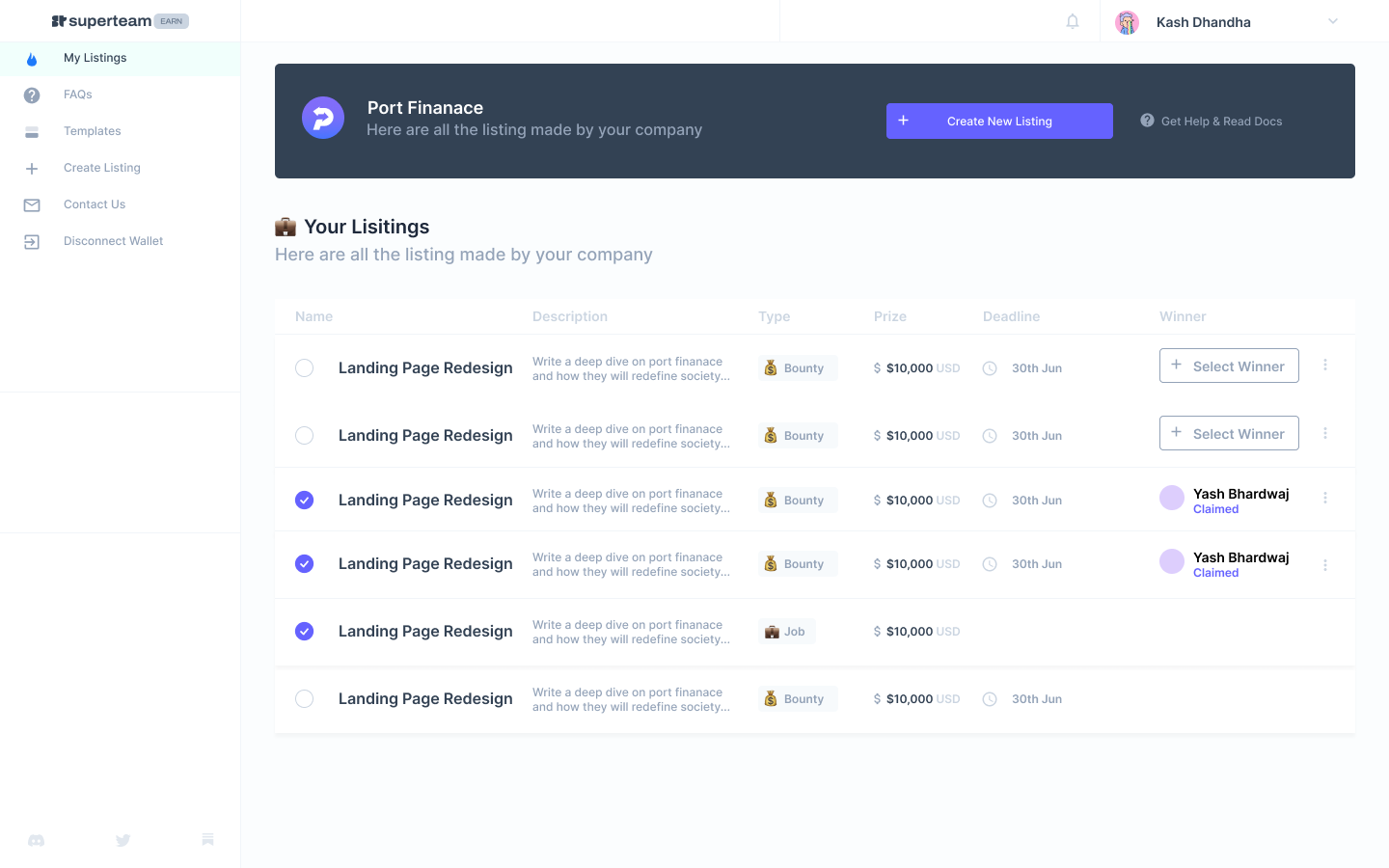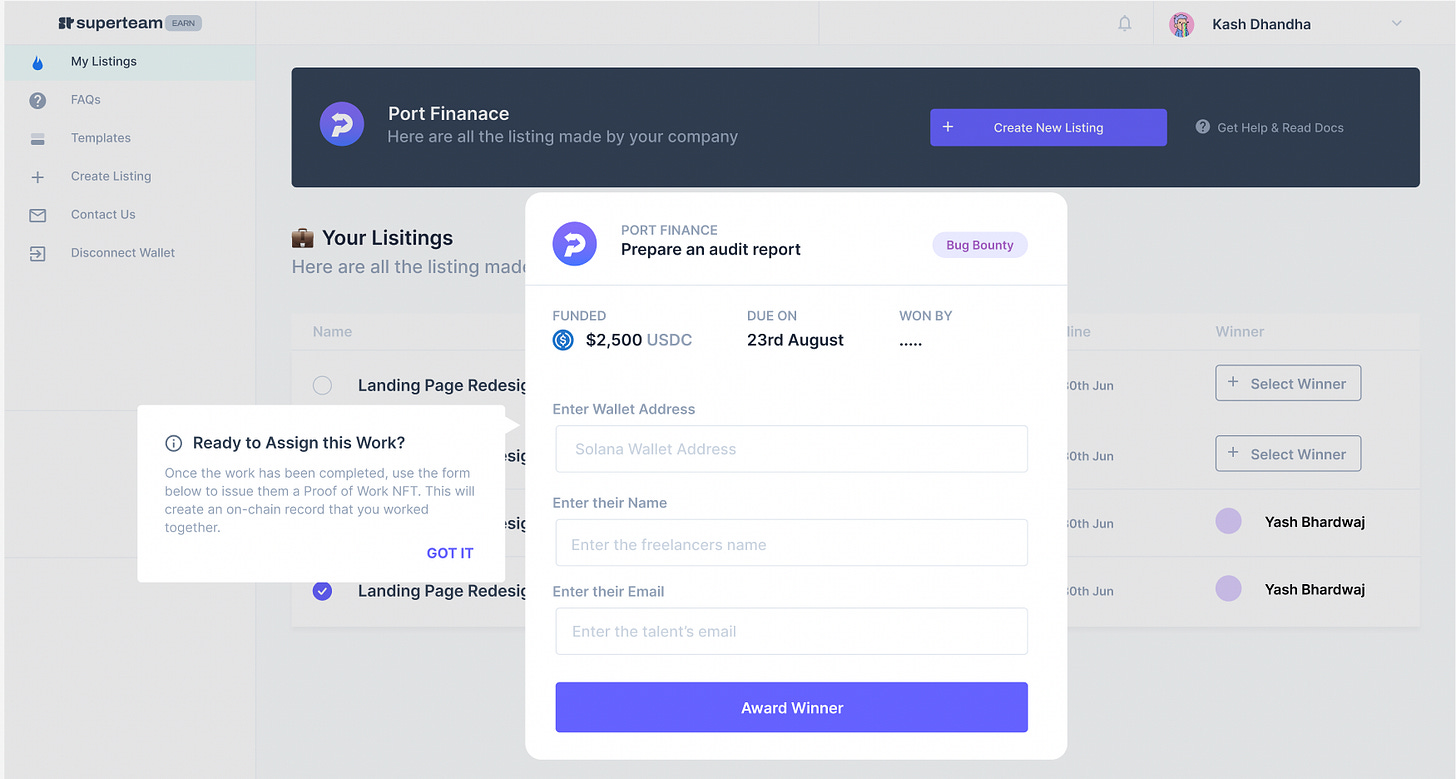Introducing Superteam Earn
Building the future of work, starting with the Solana ecosystem
The nature of work is changing from geographically restricted, rigid employment structures to more remote, global & fluid engagements. The goal of Superteam Earn is to build tools for the future of work, powered by crypto rails.
The rest of this essay examines the changing nature of work and how we can better meet the needs of both talented workers & employers.
TL;DR
The future of work is global, remote, async & creative. These trends were accelerated by Covid lockdowns but are here to stay.
Corporations & Individuals alike are re-organising for this new reality. We’ll see a lot more experiments like flexible hours, moonlighting clauses, hybrid work, going cloud-first etc.
A new paradigm of work requires new infrastructure for engagement, payment & feedback.
Today, access to remote work is skewed. (i.e. the future of work is here, it is unevenly distributed)
Superteam Earn is built on the back of a year’s learnings at building a community that has completed missions, bounties & grants worth $750k. This platform is the first of many iterations to come.
The first version ships with a composable backend, escrow services to manage payments & an on-chain resume via a proof of work NFT.
For talent, discover all the earning opportunities in the Solana ecosystem here
For projects, list your opportunities and discover the best talent now.
Inheriting Defaults
It is obvious that the current employment structures are generally biased towards the employer or the corporation. This is our inheritance from the industrial age. As humans moved away from agriculture to factories, the primary assets were land, capital & machines. Human labour was a necessary cost to operate these assets. This resulted in rigid working hours, opaque wages, timed breaks, linear hierarchies etc.
The default effect means that we’ve blindly inherited these structures as we ushered in the information age. The rate of global change is faster than what individual units like countries, companies & people can adapt too. Our brain is wired to accept the environment we’re born in as the default. We seek comfort in its familiarity and resist change. Hence it is always a small group of misfits who push the world forward, the rest of us can only hope to keep up. (Btw, I say this with no judgement - finding comfort & satisfaction in the present is a super power too.)
While the image below is over-simplified, it is a useful representation of how our society has evolved. Notice that we’re compounding crazy. Each subsequent phase was ushered in much sooner than its predecessor. We hunted for over 200,000 years, farmed for 12,000 years & took only 300 years to move from the industrial to the information age. It is not surprising that our societal structures at large are lagging.
Applying or modifying industrial age techniques in the information age doesn’t make sense. They constrain both freedom of employees & the output for companies. Technology companies like Google recognised this first & pushed the needle forward in designing a work culture that treats people like creative assets and not enhanced machines. Many companies have tried to blindly mimic Google's approach and failed. Mostly because they don’t have the margins of a monopoly search business that google has. This doesn’t mean that the older ways of working are better. Only that we need to find the right financial & societal models for making these newer ways work.
This is just the beginning, not the end.
The Future of Work - Remote, Global & Fluid
Remote work was developing as a fringe culture for a while until it was accelerated by covid-related lockdowns. I think the extent and permanence of this change is under-appreciated. We’ll illustrate this with the following images.
Even as cities open up, people want to go remote. First, we compare google search trends for “covid” & “remote work”. We use this as a measure of interest among internet users. It is evident that while searches for covid have seen a sharp decline as the pandemic became a global endemic - the trend for remote work shows no such reversal.
Employers are recognising & responding to this new reality. Second, this image from the Buffer report on the state of remote work in 2022. This data is collected by surveying ~2000 people who are already working remotely, so it is biased compared to the general population. However, notice that within a similar audience of remote workers surveyed in 2022, 72% said that their companies planned to provision for permanent remote work as opposed to only 46% in 2021.
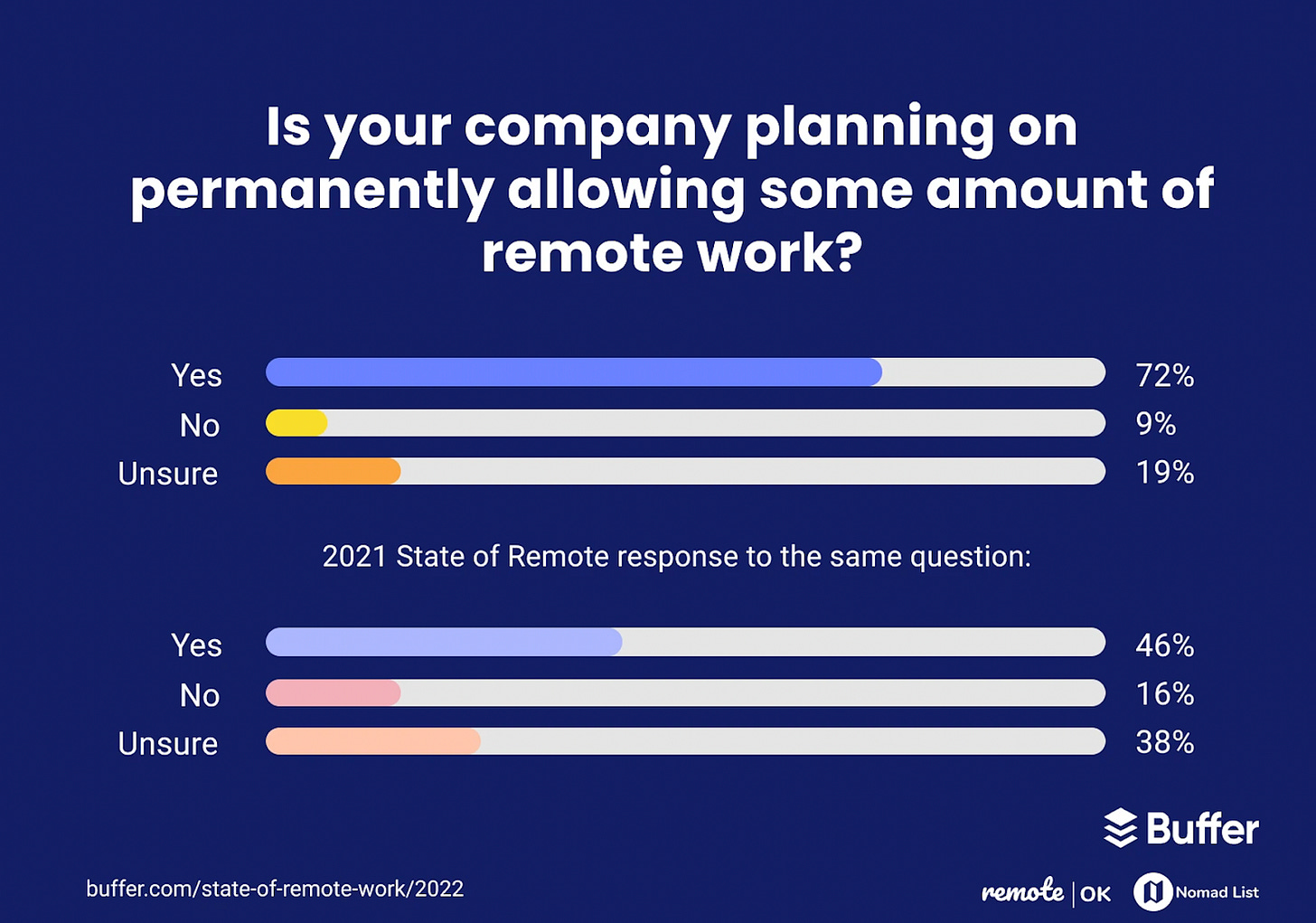
Flexibility & Freedom matters more than ever. Quoting from the same report, a key reason why people want to go remote is flexibility, of both time and location. My guess is that there are three key drivers of this. Covid made many of us viscerally realise that our time here is limited. People now see the geographical arbitrage of working in a global talent market (e.g. you earn more by working for a US company while working & living anywhere in the world). In a world that is now changing faster than ever, people value the freedom to work on newer ideas and problems.The world changes more in the most recent 20 years than it did since the beginning of time. Feels mind-blowing when you think of it that way. I know that for me personally, the answer lies at the intersection of these three. If you’ve got a different reason I’d love to hear about it in the comments.
Re-imagine Remote-first
So far, most attempts at imagining flexible and remote work have involved a few employees or freelancers working around corporate structures. This doesn’t work. When most of the team sits in the same office and follows the same hours, anyone wanting flexibility becomes an “outsider”. Labelled as someone who isn’t as serious about work, poorly integrated with the rest of the team & unlikely to see any meaningful career or financial growth within the company. The narrative becomes about adjusting to “their” work hours or creating documentation to support them. Meetings with 9 people in the room and one person on zoom are a disaster. Force fitting or tip-toeing around archaic industrial age office paradigms is ineffective and unnecessary.
Instead, we imagine entirely new structures for both existing and new companies. Ones that are headquartered in the cloud or have only satellite offices. With a focus on how smaller teams within the company locate, organise and operate - instead of setting the same rules for the entire company. We expect freelance work via grants, bounties & short term contracts to become more common beyond just technology & developers.
Access to Remote is Skewed
If you go by statistics from Nomadlist, today - the average remote worker (or nomad) is a 33 year old, American white male who works as a developer. Less than 1% of the community had Indian nationals BUT 5% are Indian by ethnicity. The community is already comprised 40% non-white individuals but over 80% of all nomads are from rich countries. As global wages become more accessible this geographical advantage will fade away.

We expect the skew to decrease over time. Newer & immersive technologies will help co-ordinate people and payments better. Access to global opportunities & wages will open up remote work to people across the world. Workplaces will design more flexible work policies to retain their workforce - ironically this will probably be the largest wave of people onboarded to remote work. Even now, we can see that nearly half of the nomads already work full time. Cities will develop better security & infrastructure for short-term residents. Only 20% of nomads are women, this will change as cities prioritise safety, maternity and public hygiene to attract top talent. This is not a given, but if the demand for remote work sustains at the current levels then it is the most likely outcome. With Superteam Earn, we hope to play a small part in making this a reality.
Crypto & Web3 are Leading Indicators
As per a recent report from Framework, a majority of their portfolio companies consider themselves fully distributed. Even those HQ’d in the US have ~33% of their employees globally distributed.

It is important to emphasise that crypto and web3 is just the starting point. Almost through serendipity the space lends itself well to futuristic work structures. Let’s examine this in a little more detail. Because crypto started as a fringe movement of a pseudonymous leader, it likely attracted people who shared similar values and defined the early culture. If the first n hires define the culture of a company, the first n people to shape the crypto space as we know it today were globally distributed, operating under multiple anon identities and working on ideas they were inspired by.
It massively helped that we have global payment rails built on smart contracts and native tokens. This means you don’t need to rely on traditional financial systems and the friction they bring. It means that anyone who works in crypto can share in the true upside of the value they’ve created by holding native tokens. Unlike traditional companies which lack the incentives or infrastructure to distribute equity across the spokes of the network, crypto does it by default.
Traditionally we could have only a single identity across our personal, public and professional lives. This is because the enforcement layer for contracts still relies on analog proofs that can only be verified through flesh & blood (showing up, signing a document in person, biometric verification). Crypto enables a digital verification layer for all transactions and contracts, signing messages through your private key. This moves focus from your gender, appearance, race, location to the quality of your work. It frees our minds from the biases we’ve built up over years and frees individuals from the baggage of structures they were born into. Watch Balaji’s talk on pseudonymity here.
The bottom line is that we get a more accessible and efficient talent matching system by circumventing the known and unknown human biases.
Over time we expect these characteristics to permeate across all sectors of work. Payments systems will get upgraded to reduce the cost of global transactions, contracts will be enforced and adjudicated based on digital proofs, there will be infinite capital assets freely tradable with stable currencies. Just like the internet has brightened or burnt everything in its path, we expect crypto to do that same.
Superteam Earn - Product Principles
There are three key principles around which we’ve designed the first version of our product - more flexible terms of engagement (bounties, grants, jobs), supplement trust (escrow, proof of work NFT) and simultaneously add more depth and customisation to the discovery marketplace.
Terms of Engagement
We need a spectrum of options to engage with people that vary based on the complexity of the task at hand. Some work is best done through engagements like bounties, freelance assignments and short-term contracts in a remote setup. While other types of work might need people to be co-located and committed for larger periods of time (i.e. jobs). We can argue about the merits & demerits of these approaches, but you have to admit that defaulting to an FTE approach for ALL cases like we do today is definitely suboptimal. At superteam, we’ve experimented with a range of products within our community.
Companies are trying out hybrid approaches, limited # of days/week IRL, satellite offices or going entirely remote. It is fine for companies to choose to call employees back to the office for a five day work week. They don’t want to bear the cost of failed experiments in the short term. They will most likely suffer the consequences of talent drain & a larger culture shock in the long run. Another emergent trend is that of async work. Touted as the evolution of remote work, it provides more than freedom of location. In the same Buffer report, 52% of respondents said they wanted async first work policies from their current employer.
Having a menu of engagement options is good not just for talent but also for employers. Companies today are “forced” to hire full time in the absence of a sufficiently credible freelance market. This results in bloated teams with nothing to do, frustrated hires & internet memes. This will change as freelance and gig work becomes more mainstream. It will be easier to discover and verify good talent, there will be tools for them to quickly build context, execute & exit.
We expect that the mix of work that gets done through loosely structured engagements like bounties & grants is only going to increase over time. These don’t need to replace jobs, that’s not the goal. Instead both companies & talent can choose the type of engagement that works best for the task at hand at the given point in time. On Superteam earn, you will find a vast range of work options including grants, bounties, jobs, etc.
Supplement Trust
Talent needs to be paid fairly for their work. Sponsors need to have confidence that their work will get done.
Here’s how companies solve this. You have a manager, they have a manager. You’re expected to be available at certain times, if you’re not - your manager backfills somehow and pulls you aside for a “chat”. Your reputation is updated every appraisal cycle. You get a fixed salary, a bonus and maybe some equity for your past performance. You check with your peers and hope it is fair but have no real clue. A proxy for trust is how long you’ve spent and how much you’ve grown within a company. This is why constant job-switching is frowned upon.
An era of work that optimises for flexibility does not benefit from trust built through long term associations. We need to find ways to supplement this trust in other ways. In its first version there are 2 features on Superteam to achieve this.
Escrow Payments. To mitigate the risk of non-payment by projects, we’ve built an escrow account which holds the amount committed to a particular piece of work. This ensures that the person signing up for work can verify that the project is both capable & sincere about paying the advertised amount.
Proof of work NFT. To mitigate the risk of non-delivery by talent, we are creating an on-chain resume. To start with, this will carry the verified on-chain earnings paid out through escrowed opportunities. Over time we expect this to carry a lot more information including feedback & demos from past work.
Deep Networks with Narrow Interfaces
We believe that marketplaces of the future will have network depth and interface customisation.
This builds on the idea of Data Composability. So far, platforms had to race to build the largest networks for their products. There is a winner-takes-all effect when it comes to corporation owned data networks. Unfortunately, this results in a death spiral towards the least common usable interface.
In the future it will seem crazy that we used a single interface to share photos of our family, recipes, travel, adventure sports, workouts, etc. Or that the professional network for developers, marketeers, artists, etc. looks the same. Or that the listing page for a refrigerator and a mobile phone was exactly the same. Anyone who tried to compete on the interface layer with these monopolies had already lost the battle at the network layer.
The power of public blockchains means, now we can have both. Consumers retain ownership over their own data secured on-chain. Any application can build the best interface for a specific use case on top of this network. This is why we’re using a blockchain to store both opportunities (listings) and talent outcomes (proof of work).
Overview of Product Principles
Before we move on to a product walkthrough, here’s a quick recap of the key product principles of Superteam earn & how we hope to contribute to building the future of work.
Superteam Earn - Product Walkthrough
There are four key features we’ve shipped in the first version
A composable database of aggregated listings
Escrowed Payments
Proof of work NFT
Discovery Interface
A composable database of aggregated listings
We’ve launched with ~300 opportunities & total value listed of $13m.
The first goal of Superteam Earn is to provide all the earning opportunities of the Solana ecosystem in a single place. To that end, we will be aggregating listings across multiple partners. Given that Superteam is built by and for people who are working in web3 we have a unique vantage point into the problems of both talent & sponsors. While it is tempting for a product like this to focus on exclusivity or the consistency of listings, we’ve chosen to optimise for depth. We know firsthand the value of aggregating ALL opportunities in a single place above all else.
Linking back to the principle of data composability from the previous section, we’ve published these listings on-chain. For example, here is the IPFS link to the Stellar Sol Landing page mission. This is inviting others to build competing interfaces on top of a shared asset. It opens up the possibilities of building niche customised interfaces that serve a small group of users really well, along with the efficiencies of everyone being on a shared network.
Over time questions of governing standards for the different types of listings, structure within each listing, write permissions, etc. will emerge. It is difficult to predict right now what kind of monetary & governance structures are needed to maintain and scale something like this. The goal is to scale the underlying network with the efficiency of a web2 platform while allowing for heterogeneous services & interfaces to be built on top of it.
Escrowed Payments
Sponsors can choose to escrow funds along with their listing. Here’s the escrow account for the Stellar sol mission we just saw. This is a tactic to supplement trust and increase the likelihood of payment to talent.
We expect escrows to be most useful for short time commitment work, like bounties. This approach is not foolproof. There is still the question of who verifies whether the work is “complete” and triggers the escrow. This can’t be automated because most work won’t happen on-chain and will need human adjudication. Our goal is to supplement this process not replace it (assuming that is even possible).
However, from a year of managing grants, bounties, missions etc and building a community GDP of $700k, it seems obvious that an escrow is one powerful tool at ensuring payments. It signals seriousness on behalf of the project. It reassures talent that an opportunity is backed by real funds. This is typically a sufficient signal that a project is operating in good faith. Furthermore, no project wants their funds locked in escrow for ever creating a public, running scoreboard of payments they defaulted on.
We believe that setting up and honouring an escrow will become a signal of trust over time. You will be able to filter opportunities by “escrow” just like you can, for e.g. filter airbnb by “verified host”. Projects that default on escrows will get called out, apart from losing their funds.
However, escrows only make sense if you have a single sourcing point. Imagine having to escrow 5x the work amount because you need to list on many different platforms. This reinforces the importance of building a single shared network as a public good.
Proof of Work NFT
Once a piece of work is completed, the sponsor can issue a proof of work NFT if it was an escrowed listing. The goal is to create the ideal public resume which helps both talent & sponsors.
Instead of your work being gated within the silos of a company or a professional network, we export parts of it to a public database that you own. The first step is publishing your verified on-chain earnings. This helps spotlight talent that may not have conventional credentials but has delivered real value. Yes, everything we do is for the young Indian developers shipping million dollar software from their parent’s living room :)
Over time, the talent NFT can become a valuable primitive contributing to a person’s overall on-chain identity. Initially it will serve as a means for talent discovery, but over time it can be used for people to organise around professional niches, credit scoring, etc.
Imagine a founder wants strategy advice from people who have earned at-least x $$ or worked for at-least z years or <insert criteria of choice>. They can simply post a public link on a service like huddle and gate it based on the proof of work NFT. Interested people can join, talk shop and leave. They may even be able to stake $$ and stream them per minute to everyone who joins.
An important point to note is that we’ve intentionally restricted the proof of work NFT to escrowed opportunities so that the data is high quality. Even though a relatively smaller number of opportunities will be escrowed to begin with, we expect this to grow over time. It is tempting to optimise for NFT issuance and richness in the short term, but the real asset is the quality of the information not quantity. If you can’t trust it, it is useless.
Over time we will find ways to include both future & historical information into the proof of work NFT. DMs are always open for ideas.
Product Trade-offs
Here’s a quick overview of key tradeoffs we’ve made in the first version of the platform.
You may notice that the UX for applying & listing pages is inconsistent across partners. Or that the proof of work NFT is restricted to escrowed bounties which are a small % of all opportunities. These are conscious product tradeoffs taken with a long term view. As mentioned earlier, optimising for number of listings instead of exclusivity allows us to seed a single composable backend, makes escrows more viable, etc. And ensuring that the talent NFT is high fidelity and trustworthy is more important than coverage. The team will continue evaluating these decisions as the product evolves.
User Interface
The most visible part of the product, the superteam earn website.
For talent - you can discover and apply to bounties, grants & jobs. They’re currently categorised by skills, recency & expiry, and $$ value. We’ll continue iterating and making it easier to discover the best work opportunities for you.
For sponsors - you can list an opportunity, invite known talent to apply and authorise the escrow and NFT.
User Journeys
For Talent
#1 Discover & apply for work
1.1 Take your pick from bounties, grants & jobs…
1.2 Browse across 7 different skill categories…
1.3 Never miss an opportunity…
1.4 If you know what you’re looking for, search…
#2 Claim NFT & Escrowed funds
Once a sponsor of an escrowed opportunity approves you as the recipient, you’ll receive an email that allows you to withdraw payment and claim
Sponsors
#1 Create a company profile.
You have to do this only the first time you’re listing an opportunity.
#2 List opportunity
#3 Define Payment Terms
3.1 You have the option to deposit funds in Escrow..
3.2 Or toggle escrow off, and settle directly outside the platform
#4 Listing dashboard
4.1 View all your listings in one place
4.2 Approve work, issue payment & a Proof of Work NFT
The Team
The core team that pulled this off
Supported with love from the wider superteam community
Getting Involved
This is just the first version of a platform that was already a year in the making. Here are a few ways you can get involved
Find work: Here’s a bunch of resources to help you get started.
Sponsor work: The best place to hire in the Solana ecosystem
Share feedback: If there’s something you love or wish was different, let us know via twitter/discord etc.
Upvote us on product hunt.
Thanks to Kash & Pratik for their feedback on drafts of the essay.
Disclaimer: This post is not financial or investment advice. It is meant for informational & educational purposes only. Please do your own research about risks and compliance before buying, investing/ or trading.






